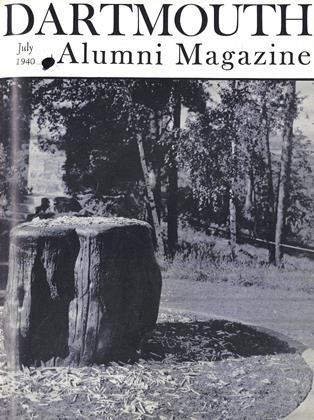By Ernest R Groves '03. J. B. LippincottCompany, 1940, 631 pp. $3.50.
What Professor Groves has set out to do is to interpret "the meaning both to the individual and society of the family as a human experience." Consistent with this theme, he begins his discussion with some general considerations concerning the social adjustment and survival functions performed by the human family as contrasted with anything on the animal level. Viewing domestic relationships as the outgrowth of the prolongation of human infancy, he shows how the satisfaction of the incentives of identity, perpetuity and transcendency have been transformed from an organic basis to a social level.
With this as a groundwork, he discusses the interrelations of the family with the other institutions of society. The microcosm of government, education, sex status and religion is viewed in terms of the microcosm of the family. Not only does the family support these other institutions, but also within this primary group there can be observed the meeting of the need for regulation and control, for the transmission of the cultural heritage, and for the adjustment of the individual to the universe.
The family as a "unity of interacting personalities" is the theme of the succeeding section. Here the author demonstrates how the thwartings or fulfillments of personality needs within the family make for adjustment or maladjustment of the individual on the larger social stage. Consideration is given to the satisfaction of the wishes for security, response and recognition, as well as the direction of such temperamental and emotional traits as dominance, aggression, escape, anger, love and hate.
Following an adequate summary of signifi- cant social thinking (past and present) con- cerning marriage and the family, the author ventures some projections of contemporary trends into the future. Here there is no whis- tling in the dark but a frank appraisal of facts growing out of a long and unequalled experience in teaching and family guidance. It is a fallacy to view the present family in terms of some past familiar configuration as a norm. Rather must the family be studied as a continuing institution seeking to meet the needs of human beings who are in the process of adaptation to a highly dynamic society.
 View Full Issue
View Full Issue
More From This Issue
-
 Article
ArticleCommencement Climax of 171st Year
July 1940 -
 Class Notes
Class NotesThirtymen Celebrate With Record 265 Reuners
July 1940 By BUD FRENCH '30 -
 Class Notes
Class NotesThirtieth Reunion of 1910
July 1940 By H. P. HINMAN -
 Class Notes
Class NotesGreat Twenty-Fifth for 1915
July 1940 By DONALD C. BENNINK -
 Article
ArticleBaccalaureate, 1940: The Upright Man
July 1940 -
 Article
ArticleDartmouth Remembers' Craven
July 1940
Andrew G. Truxal
Books
-
 Books
BooksMr. William A. Hunt '28 is the author of an article
June 1933 -
 Books
BooksTHE TWO LIVES OF JAMES JACKSON JARVES,
January 1952 By CHURCHILL P. LATHROP -
 Books
BooksThe Second Generation
December, 1923 By E.P. Kelly. -
 Books
BooksFLAMES OF LIFE: A PICTORIAL PHILOSOPHY.
May 1961 By FORD H. WHELDEN '25 -
 Books
BooksWAR BELOW ZERO
December 1944 By Herbert F. West '22 -
 Books
BooksTHE DAMNED WEAR WINGS.
By HERBERT W. WEST '22





